We've not reported on Criterion's new releases for a while now, largely because their PR company stopped sending us the press releases, but with multi-region Blu-ray players now a lot more affordable than they once were, our intrest is once again piqued. And there are some typically lovely titles in their November line-up, namely Kurosawa's Rashomon, Pasolini's Trilogy of Life, Godard's Weekend, Michael Cimino's Heaven's Gate and the Eclipse box set, When Horror Came to Shochiku.
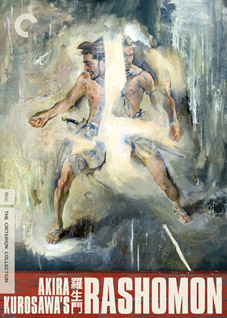
Rashomon (Japan, 1950) – Blu-ray ($39.95) / DVD ($29.95) – 6th November 2012
A riveting psychological thriller that investigates the nature of truth and the meaning of justice, Rashomon is widely considered one of the greatest films ever made. Four people recount different versions of the story of a man's murder and the rape of his wife, which director Akira Kurosawa presents with striking imagery and an ingenious use of flashbacks. This eloquent masterwork and international sensation revolutionized film language and introduced Japanese cinema – and a commanding new star by the name of Toshiro Mifune – to the Western world.
Featuring a new digital restoration, with uncompressed monaural soundtrack on the Blu-ray edition and new English subtitle translation, the release will have the following extra features:
- Audio commentary by Japanese-film historian Donald Richie;
- Video introduction by director Robert Altman;
- Excerpts from The World of Kazuo Miyagawa, a documentary on Rashomon's cinematographer;
- A Testimony as an Image, a sixty-eight-minute documentary featuring interviews with cast and crew;
- Archival audio interview with actor Takashi Shimura;
- Original and rerelease trailers;
- A booklet featuring an essay by film historian Stephen Prince; an excerpt from director Akira Kurosawa's Something Like an Autobiography; and reprints of Rashomon's two source stories by Ryunosuke Akutagawa, Rashomon and In a Grove.
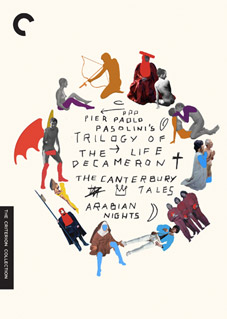
The Trilogy of Life (Italy, 1971-1974) – 3-disc Blu-ray ($79.95) / 4-disc DVD ($79.95) – 13th November 2012
In the early 1970s, the great Italian poet, philosopher, and filmmaker Pier Paolo Pasolini brought to the screen a trio of masterpieces of premodern world literature – Giovanni Boccaccio's The Decameron, Geoffrey Chaucer's The Canterbury Tales, and The Thousand and One Nights (often known as The Arabian Nights) – and in doing so created his most uninhibited and extravagant work, which he titled his Trilogy of Life. In this brazen and bawdy triptych, the director set out to challenge consumer capitalism and celebrate the uncorrupted human body while commenting on contemporary sexual and religious mores and hypocrisies. His scatological humor and rough-hewn sensuality leave all modern standards of decency behind; these are physical, provocative, and wildly entertaining films, all extraordinarily designed by Dante Ferretti and featuring evocative music by Ennio Morricone.
In The Decameron (1971) Pasolini weaves together stories from Giovanni Boccaccio's fourteenth-century moral tales in this picturesque free-for-all. The Decameron explores the delectations and dark corners of an earlier and, as the filmmaker saw it, less compromised time.
Eight of Geoffrey Chaucer's lusty tales come to life on-screen in Pasolini's gutsy and delirious The Canterbury Tales (1972), which was shot in England and offers a remarkably earthy re-creation of the medieval era.
In Arabian Nights (1974)Pasolini traveled to Africa, India, and the Middle East to realize this ambitious cinematic treatment of a handful of the stories from the legendary The Thousand and One Nights.
With new high-definition digital restorations of all three films, with uncompressed monaural soundtracks on the Blu-ray editions and new English subtitle translations, the set will have the following extras:
- New visual essays by film scholars Patrick Rumble and Tony Rayns on The Decameron and Arabian Nights, respectively;
- New interviews with art director Dante Ferretti and composer Ennio Morricone about their work with Pasolini, and with film scholar Sam Rohdie on The Canterbury Tales;
- The Lost Body of Alibech (2005), a forty-five-minute documentary by Roberto Chiesi about a lost sequence from The Decameron;
- The Secret Humiliation of Chaucer (2006), a forty-seven-minute documentary by Chiesi about The Canterbury Tales;
- Via Pasolini, a documentary in which Pasolini discusses his views on language, film, and modern society;
- Pier Paolo Pasolini and the Form of the City (1974), a sixteen-minute documentary by Pasolini and Paolo Burnatto about the ancient Italian cities Orte and Sabaudia;
- Deleted scenes from Arabian Nights, with transcriptions of pages from the original script
- Pasolini-approved English-dubbed track for The Canterbury Tales;
- Trailers;
- A booklet featuring essays by critic Colin MacCabe; Pasolini's 1975 article “Trilogy of Life Rejected”; excerpts from Pasolini's Berlin Film Festival press conference for The Canterbury Tales; and a report from the set of Arabian Nights by critic Gideon Bachmann.
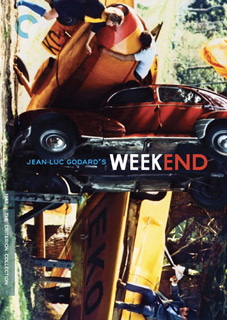
Weekend (France, 1967) – Blu-ray ($39.95) / DVD ($29.95) – 13th November 2012
This scathing late-sixties satire from Jean-Luc Godard is one of cinema's great anarchic works. Determined to collect an inheritance from a dying relative, a bourgeois couple travel across the French countryside while civilization crashes and burns around them. Featuring a justly famous centerpiece sequence in which the camera tracks along a seemingly endless traffic jam, and rich with historical and literary references, Weekend is a surreally funny and disturbing call for revolution, a depiction of society retreating to savagery, and – according to the credits – the end of cinema itself.
Featuring a new restored high-definition digital transfer, with uncompressed monaural soundtrack on the Blu-ray edition, the release will have the following extras:
- New video essay by film critic Kent Jones;
- Archival interviews with actors Mireille Darc and Jean Yanne and assistant director Claude Miller;
- Excerpt from a French television program on director Jean-Luc Godard, featuring on-set footage of Weekend shot by filmmaker Philippe Garrel;
- Trailers;
- A booklet featuring an essay by critic and novelist Gary Indiana.
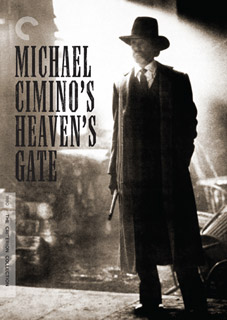
Heaven's Gate (USA, 1980) – 2-disc Blu-ray ($49.95) / 2-disc DVD ($39.95) – 20th November 2012
A visionary critique of American expansionism, Heaven's Gate, directed by Oscar winner Michael Cimino, is among Hollywood's most ambitious and unorthodox epics. Kris Kristofferson brings his weathered sensuality to the role of a Harvard graduate who has relocated all the way to Wyoming as a federal marshal; there, he learns of a government-sanctioned plot by rich cattle barons to kill the area's European settlers for their land. The resulting skirmish is based on the real-life bloody Johnson County War of 1892. Also starring Isabelle Huppert and Christopher Walken, Heaven's Gate is a savage and ravishingly shot demystification of western movie lore. This is the full director's cut, letting viewers today see Cimino's potent original vision.
This director-approved special edition boasts a new, restored transfer of director Michael Cimino's cut of the film, supervised by Cimino and a new restoration of the 5.1 surround soundtrack, supervised by Cimino, in DTS-HD Master Audio on the Blu-ray edition, plus the following extras:
- New illustrated audio interview with Cimino and producer Joann Carelli;
- New interviews with actor Kris Kristofferson, soundtrack arranger and performer David Mansfield, and second assistant director Michael Stevenson;
- The Johnson County War, a video interview with historian Bill O'Neal about the real-life conflict that inspired the film, and its resonance in popular culture;
- Trailer and TV spots;
- A booklet featuring an essay by critic and programmer Giulia D'Agnolo Vallan.
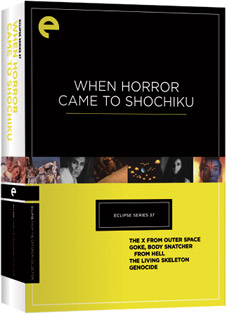
Eclipse Seies 37: When Horror Came to Shochiku (Japan, 1967-1968) – DVD ($59.95) –
20th November 2012
Following years of a certain radioactive rubber beast's domination of the box office, many Japanese studios tried to replicate the formula with their own brands of monster movies. One of the most fascinating dives into that fiendish deep end was the short-lived one from Shochiku, a studio better known for its elegant dramas by the likes of Kenji Mizoguchi and Yasujiro Ozu. In 1967 and 1968, the company created four certifiably batty, low-budget fantasies, tales haunted by watery ghosts, plagued by angry insects, and stalked by aliens – including one in the form of a giant chicken-lizard. Shochiku's outrageous and oozy horror period shows a studio leaping into the unknown, even if only for one brief, bloody moment.
The films included are:
The X From Outer Space [Uchû daikaijû Girara] (Kazui Nihonmatsu 1967)
When a scientist crew returns from Mars with some space spores that contaminated their ship, they inadvertently bring about a nightmarish Earth invasion.
Goke, Body Snatcher From Hell [Kyuketsuki Gokemidoro] (Hajime Sato 1968)
After an airplane is forced to crash-land in a remote area, its passengers find themselves face-to-face with an alien force that wants to possess their bodies and souls – and perhaps take over the entire human race.
The Living Skeleton [Kyuketsu dokuro sen] (Hiroshi Matsuno 1968)
In this atmospheric tale of revenge from beyond the watery grave, a pirate-ransacked freighter's violent past comes back to haunt a young woman living in a seaside town.
Genocide [Konchû daisensô] (Kazui Nihonmatsu 1968)
The insects are taking over in this nasty piece of disaster horror directed by Kazui Nohinmatsu. A group of military personnel transporting a hydrogen bomb are left to figure out how and why swarms of killer bugs took down their plane.
|